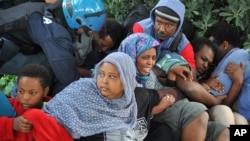In Eritrea’s mass exodus, all signs lead to Italy. If the migrants survive the Sahara, the kidnappers who rape and hold them for ransom, jihadists who would cut off their heads, and small leaking boats on the Mediterranean, they are likely to meet Father Mussie Zerai, a ‘Father Moses’ who sees them safely to shore and guides them through Europe’s political minefield.
Father Mussie has been nominated by supporters for the United Nation’s refugee agency’s Nansen award and the Nobel Peace Prize.
The recent explosion of migrants from Africa and Syria gained international attention last year, but for 40-year-old Mussie, it began in the early 1990s when he left home as a youth.
Father Mussie is now a parish priest in a Catholic diocese in Switzerland. He is also the unofficial ambassador for thousands of migrants who have fled Eritrea, Ethiopia, Sudan and Somalia.
His cell phone number is scrawled on the hulls of boats that carry their human cargos to Europe. Migrants from throughout the Horn of Africa call him when their boats begin to flounder and sink in the Mediterranean.
On becoming ‘Father Moses’
“Time by time,” the priest recalls on his well-used cell phone, “I become public figure and, like one of the main points for asylum seekers and refugees from Horn of Africa - especially for Eritreans - because even me, I am Eritrean. Even me, when I come for the first time to Europe, I came like an asylum seekers, a refugee.”
When Mussie fled from Asmara, Eritrea was still fighting for its independence from the Marxist regime of Mengistu Haile Mariam of Ethiopia. From Rome, he has watched the re-birth of Eritrea, and has been disappointed.
“Eritrea is one of these country … really a failed state because the government - the regime in Eritrea - is totally authoritarian, totally despotic.
“So, why these people is obligated to escape from the country? Because no, we don’t even had constitution. “
Father Mussie started to help African migrants in 1995. He began getting calls for help on his cell phone five years later. He created the Agenzia Habesha web site for his rescue work.
He helps identify the dead, visits detention centers in Italy, meets with members of European parliaments and European Union commissioners. And in the spring when weather is good for sailing, he starts getting the calls.
Just a week earlier, he served once again as a first responder.
“I receive some calls, especially from two boats with 600 refugees or asylum seekers. The second one is around 450. So, finally, more than 1,000. When I received these distress calls I informed the Italian Coast Guard, the Maltese Coast Guard and the other organizations like UNHCR. We all tried to follow up the process of rescue.”
More immigrants continue to reach European shores. In the past six months the International Office for Migration and the U-N refugee agency have estimated 200,000 migrants have landed in Europe.
Is Europe behaving like a union?
Father Mussie has lobbied migration officials and legislators in Rome and in the European Union in Brussels to argue for a humane policy for settlement of the migrants. But he says Europe nations suffer from their limited political perspectives.
“For long time European Union,” Father Mussie says, “he don’t see this problem like European problem. He look like problem of Italy, problem of Greece, problem of Spain.”
Migrants land in Italy and Greece because these countries claim the shores of the Mediterranean and are Europe’s frontline states for the Africa migration. The European Union maintains that the first country you reach must take you in. Even though – or because - Eritrea was once an Italian colony, Eritreans prefer the Scandinavian countries where relatives and liberal refugee policies welcome them.
“Now, the agenda of European Union is talk about these 40,000 asylum seekers who can transfer legally to other north European countries. Yes. Many countries like England, Denmark, France, even some of these eastern European countries she don’t accept this. Even Spain, she want to rebuild this new life in the country where we want to reach other family members. Maybe Sweden, maybe Norway, maybe Holland or Germany.”
Echoing the arguments of Europe’s other champions of migrants, Father Mussie says Africa’s migrants can help Europe’s troubled economies.
New energy for an older Europe
“We know the demography of many countries is very low because the people of the European Union is very oldest. So they need the fresh new energy to involve in this development program, the industries, the agriculture, all these sectors.
“So, is necessary to give more opportunity for these very poorest countries. Even if you want to do some agreement to send back the migrant workers, is necessary to invest in the origin countries to create jobs in the homeland.”
Earlier in their discussions, E-U commissioners considered proposals to send migration officials to examine why so many Africans are leaving their homelands.
“Even in discussion with European country MP or with commissioners I discuss even about these migrant workers,” Mussie says. “So why, I ask to the European Union - especially when I have occasion to discuss with the commissioners - I ask them,’ First step is necessary to go to the homeland of these countries to find the solution in the root of the problem.”
Father Mussie says future migration can be reduced if Europe investigates the causes of the migration. Now, however, the European policy simply debate divides migrants into those who flee for their lives and those who pursue jobs.
Father Mussie believes Eritreans and many others from Africa fall into the first category. “Asylum seeker, he don’t escape from the country with a plan to go to Europe. He escape only to save his life.”
For the European migration dilemma, Father Mussie and some of the officials in the European Union Commission have a solution - persuade Europe’s political leaders to help the countries like Eritrea to ease economic burdens and create jobs.
Part 5 of a series on the risks of the dangerous trail to Europe, why Eritreans are leaving home and whether policies in Europe and Eritrea are changing.














